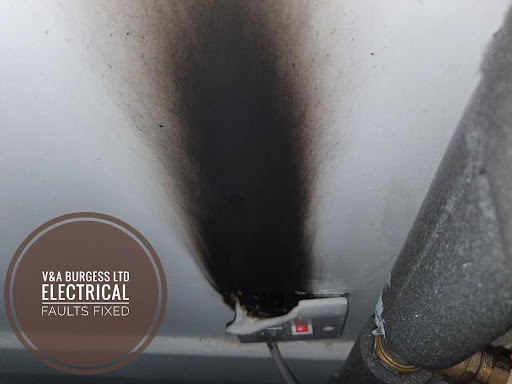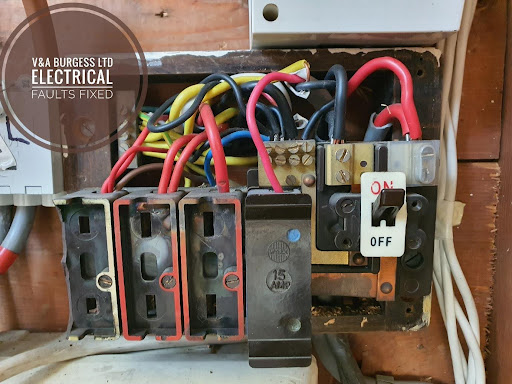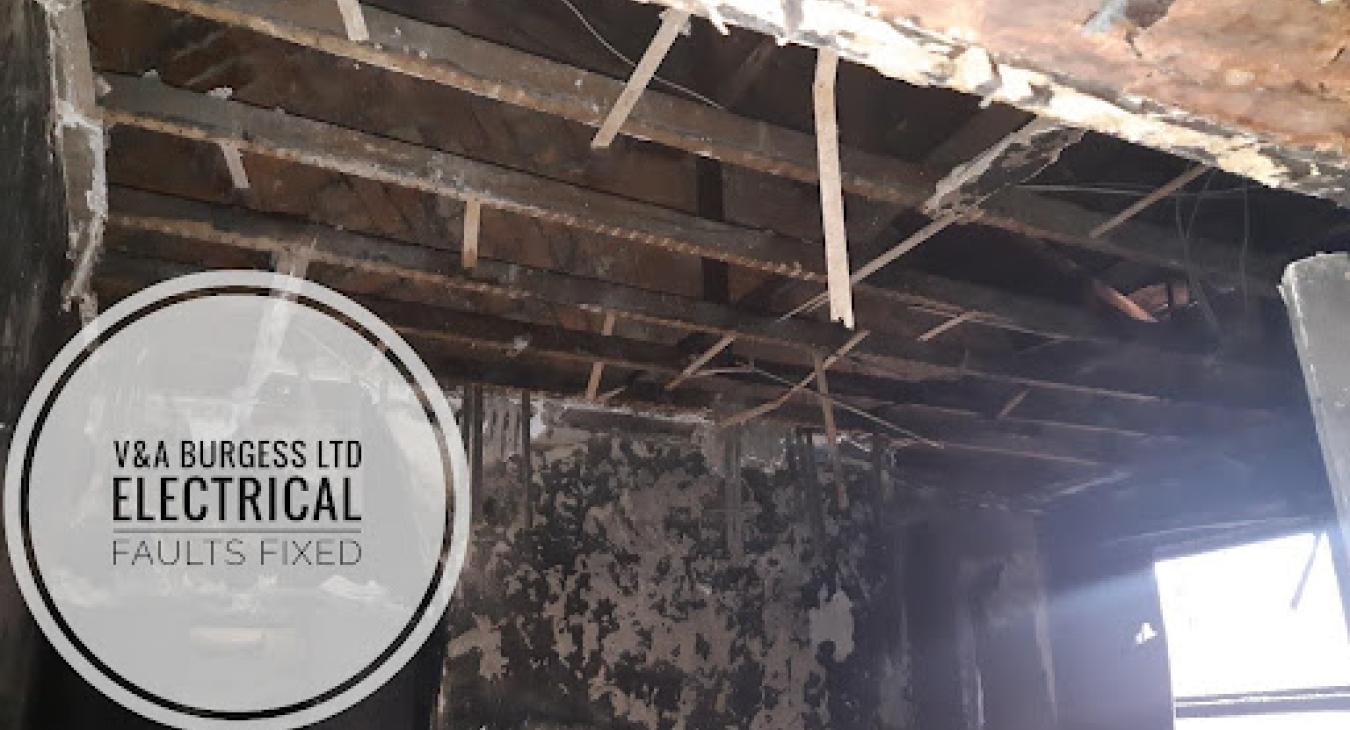"In 2021, an estimated 24,200 residential building electrical fires were reported to United States fire departments. These fires caused an estimated 295 deaths, 900 injuries & over $1.2 billion in property loss."
Source: https://www.usfa.fema.gov/prevention/home-fires/prevent-fires/appliance-and-electrical/
We look at the most common causes of electrical fires and what can be done to prevent their occurrence.
Back to top1) Extension cords
Extension cord use is intended for temporary use only and when used as a permanent solution to a lack of electrical socket outlets, the risk of overloading and fire can increase. Extension cords are not usually equipped to handle as much power as individual socket outlets and plugging in too many appliances can cause overheating and associated problems.
1.1) Prevention:
Major appliances should always be plugged directly into a wall outlet and not an extension cord, replace damaged equipment promptly, take care not to overload cords and don’t double up on extension cords.
Back to top2) Older Homes
The wiring systems in older homes will generally not be equipped to deal with the demands that modern living will place on a wiring system. Older homes tend to have fewer socket outlets, older cables and electrical panels that were all installed with much lighter use in mind from a time period where much fewer appliances were required in our homes. This can be a costly electrical problem to fix, often requiring expensive works.
2.1) Prevention:
Have an electrical inspection carried out and where necessary, rewire older systems, replace faulty or damaged equipment, and ensure that any issue flagged on the home report are taken care of.
Back to top3) Faulty Wiring
Wiring faults can occur for a variety of reasons and when this happens, the risk of fire can increases. Certain wiring faults may not be detected by older electrical panels containing older circuit protection technology and as such this can put the property at risk of an electrical fire. Poor workmanship during electrical work can increase the risk of faulty wiring or non-compliances with safety regulations.
3.1) Prevention:
Only allow a professional licensed electrician to carry out electrical work on your property and ensure that you have an electrical safety check carried out, preferably every 10 years. Have electrical issues investigated promptly and thoroughly.
Back to top4) Electrical Cords
Electrical cords are generally more of a trip hazard than a fire hazard however, it is not uncommon for electrical cords to be replaced during their lifetime. When these cords are replaced, care must be taken to ensure that they are of the same power handling capability as the original otherwise overload can occur causing the cable to catch fire before any fuses even get close to blowing.
4.1) Prevention:
Worn or damaged cords should be replaced immediately. When replacing cords, ensure they are of the same size, type, and rating. Consult an electrician if you are unsure.
Back to top5) Old Wiring
When wiring becomes old, the insulation around the copper or aluminium becomes brittle leading to circuits tripping, shorting out and possible fire risk. When this is combined with a generally old electrical system, old socket outlets and panel then the risk of fire is increased. Knob and tube wiring which was common until around the 1940s should be checked for safety by your electrician with a view to replacing it. This wiring is generally over 90 years old and has certainly given enough service.
5.1) Prevention:
Ensure that old wiring systems are regularly checked and consider a rewire of the property before any home renovations are carried out to prevent wiring system failure and décor damage later on. Have electrical issues checked quickly and repairs carried out by a professional.
Back to top6) Portable Heater
When using electrical portable heaters, care must be taken to ensure that they are in good condition and well maintained. Electrical heating elements on old coil space heaters can become covered in dust and debris which could catch fire when the heater is used again. Heaters that are faulty or particularly old can develop electrical faults causing internal shorting out and creating a fire risk. Homes are at greater risk during the winter months as temperature plummet and the need for heating increases.
6.1) Prevention:
Only use portable electric heaters when absolutely necessary, check their condition prior to use and ensure that the operating area around them is clear. Inspect the lead and appliance for signs of overheating and damage prior to use.
Back to top7) Overloaded Circuit
An overloaded circuit is a potentially dangerous situation. Whilst electrical circuits should be designed correctly and installed by a professional there are circumstances that can result in overload. If a circuit is continually gradually overloaded, wiring, and electrical panel components such as circuit breakers, can overheat and cause fires. Loose connections along the circuit and in the panel can accelerate and compound the effects.
7.1) Prevention:
Take care not to use too many powerful appliances on one circuit creating excessive power load. Do not ignore an electrical panel tripping and ensure that any new powerful home appliances have the correct size and rating of electrical circuit installed professionally to supply them.
Back to top8) Faulty Appliances
As appliances age, so does their internal wiring and electrical components. Failing cable insulation, electrical circuit boards and internal components can easily overheat, short out and lead to arcing and electrical faults in old appliances.
8.1) Prevention:
Check appliances and cords regularly for any signs of damage or overheating, if appliances develop strange noises or smells then have these investigated by an appliance repair person immediately.

9) Power Surges
Whilst general and continuous overvoltage in supply can cause damage to electrical devices and other home electrical equipment, a sudden and powerful surge can cause much more damage! Electrical panels can be destroyed along with the homes wiring system in the event of a much larger surge. Fires can result from these instances and can spread quickly should there be suitable fuel in the vicinity.
9.1) Prevention:
Talk with your electrical professional about the installation of a whole home surge protection device. These devices are designed to take the hit of minor and serious surges whilst protecting your electrical panel and wiring system in the property. These devices are generally not expensive considering the possible prolonged life of your appliances and homes wiring system. A somewhat cheap and effective addition to a home insurance policy!
Back to top10) Faulty Outlets
Aging electrical outlets can develop into faulty electrical outlets. Internal high resistances can occur as worn parts start to cause issues. This in turn will create excessive heat when power is demanded from the outlet. This is a one-way path to meltdown and potential fire. Loose connections at the rear of the outlets can also have the same effect. Often, this is not noticed until the burning smell and overheating has caused damage or even fire!
10.1) Prevention:
This is something that your electrician could check for you on an electrical safety check, in the meantime, don’t use outlets where plugs slide in and out too easily as this is an indication that excessive wear has occurred and the outlet is no longer holding the plug correctly.
Back to top11) Arc Fault
Damaged wiring, loose socket outlets and other issues resulting in poor or broken connections can cause electrical arc faults. Arcing occurs when electricity jumps a gap through air between two conductive points. The temperatures generated can be several thousand degrees and as such, fires regularly occur when arcing is taking place!
11.1) Prevention:
Ensure that wiring and electrical accessories are checked by asking your electrician to carry out a thorough safety check. Replace old or worn outlets and electrical accessories and ensure that your electrical panel is replaced occasionally to comply with modern safety regulations.
Back to top12) Flammable Materials
Any electrical equipment that gives off or produces heat is likely to be a risk when placed in the vicinity of flammable materials. High powered lighting, electric heating equipment and cooking equipment are often involved in creating electrical fires along with flammable materials.
12.1) Prevention:
Before using electrical equipment, ensure that the area around is clear and free from any flammable materials. In the case of high-powered lighting, see if LED could be used instead thereby giving off far less heat.
Back to top13) Old Electrical Panel
Electrical panels, like nearly everything, do not last forever. These panels will eventually need replacing as components age and begin to fail. An old panel may not contain the technology to adequately protect your wiring system and property from electrical fires. More modern equipment contains cutting edge technology such as Ground-Fault Circuit Interrupters, Arc-Fault Circuit Interrupters and Surge Protection, to offer more protection against electrical fires, electric shock, and overload than ever before.
13.1) Prevention:
Talk with your local electrical professional to ensure that you have the best and most up to date protection installed in your property. An electrical panel replacement is a costly job and must be carried out in accordance with the local safety wiring regulations by a professional.

14) Wiring Capacity
As electric cars and other heavy electrical equipment become more available, we are asking more of our wiring systems than ever before. In some cases, the original wiring system and its overall capacity including the panel, may not have been designed for this extra load. This extra strain can result in overheating and possible electrical fires.
14.1) Prevention:
Ensure that your electrical system is up to the task. Ask a professional electrician for their advice and consider a home electrical check to ascertain the condition and suitability of your wiring system for continued use and any addition that you may want.
Back to top15) Water in Electrics
Direct property damage such as water entering the electrical system can cause havoc and create fires through shorting out and arc faults. Where water has entered electrical equipment such as light fixtures and outlets, the main panel should be shut off assuming it is safe to do so. If the panel itself has become wet then you should consider calling the emergency services and an emergency electrician. Other tradespersons will need to be called to repair the source of water ingress such as plumbers and roofers.
15.1) Prevention:
Planning home maintenance in advance can often prevent situation like this from occurring. Replacing shingles or completely re-roofing an older roof, updating the plumbing system and ensuring that any leaks in your home are professionally repaired are paramount to preventing water ingress. Keeping a suitable fire extinguisher in your home can aid in emergencies.
I hope that the highlighting of these electrical issues and preventative measures enables you to make informed decisions regarding your homes electrical system and its maintenance.
Back to topRead more articles
- Log in to post comments


